BFI London Film Festival Week 4: The Year’s Best Movies?

Alistair is a 25 year old writer based in Cambridge.…
It’s the penultimate dispatch from this year’s London Film Festival. Later this week, you’ll be able to read our thoughts on some of the big hitters including Guillermo Del Toro‘s The Shape of Water and Martin McDonagh‘s Three Billboards Outside Ebbing, Missouri. But first, here’s our roundup of some of the big and small movies playing the London Film Festival this week, and for this dispatch, Alistair, Ryan and Chloe are joined by Andrew Winter. Right, no time to waste, let’s get down to the movies!
Brawl in Cell Block 99 (Dir: S. Craig Zahler)
Alistair Ryder: S. Craig Zahler has truly upped the ante in his hotly tipped follow up to Bone Tomahawk. If his original take on the buddy western was a slow burning character piece, leading up to one of the most insane sequences of screen violence in recent memory, then his latest effort Brawl in Cell Block 99 merely extends the feeling of nihilistic unease for the entirety of its second and third act. It is, without a doubt, one of the most violent films ever made- tailor made to make audiences audibly wince at the bone cracking, brain stomping mayhem that unfolds onscreen. But due to an expertly crafted narrative, with some of the highest narrative stakes imaginable, the violence never feels excessive; it feels necessary, with every moment registering all the more painful due to the story in which it is grounded.
The slow burning first act introduces Bradley Thomas (a career best Vince Vaughn), a pacifist former boxer who has turned to the drug running business in order to save enough money to raise his soon to be born child. After he gets cheated by associates on a mission, he shoots them down in front of the police- who subsequently arrest him due to his lack of cooperation with taking down a crime syndicate. Thrown into prison for seven years, he is shortly visited by a sinister individual (played, of course, by Udo Kier) who informs him that his wife (Jennifer Carpenter) has been kidnapped, and that if he doesn’t head get transferred to a maximum security prison to kill somebody they want dead, a skilled abortionist from Korea will be putting an end to his wife’s pregnancy.
Zahler has one of the most gloriously messed up minds in contemporary Western cinema, the unrelenting visceral violence leaving me feeling physically sick, and the drastic narrative motivation leaving me shaking for a long while after exiting the auditorium. Which isn’t to say the film is humourless- a streak of jet black comedy runs counter to the punishing storyline, which eventually leads its audience into the titular cell block, a place that Don Johnson’s prison warden gladly remarks “Amnesty International would shut down if they knew it existed”. The violent sequences are choreographed expertly, with limb shattering mayhem of such brute force, it’s honestly hard for me to believe nobody got hurt during the making of the film.
Brawl in Cell Block 99 is a gloriously inventive and deliriously dark thriller that’s definitely not for the faint of heart- and even seasoned genre fans like myself found it hard to stomach at times. It’s one of the year’s best, and most impressive, films.
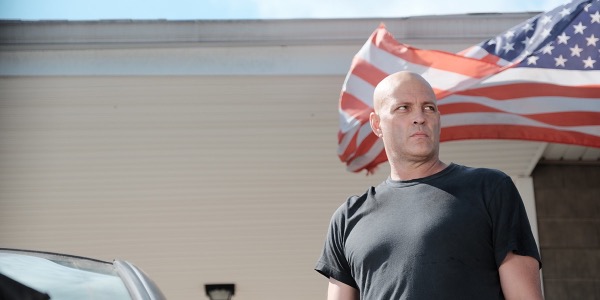
Chloe Walker: If you have watched S. Craig Zahler’s first film, Bone Tomahawk, there is one scene that will have stuck in your head. That scene contains one of the most graphic, grisly acts of violence to ever splatter on to the big screen. Two years later, it still haunts me.
Brawl In Cell Block 99, Zahler’s second feature, takes the gruesome horror of that scene and sustains it for what feels like forever. It is brutal, nauseating, unsparing… and excellent. It’s a simple story. Bradley “Don’t call me Brad” Thomas, (Vince Vaughn), winds up in a medium-security jail after eighteen months of bad luck throws him into a dodgy drug deal. One day he gets a visit from a creepy gentleman (Udo Kier- of course!), who informs him his pregnant wife (Jennifer Carpenter) has been kidnapped. Unspeakable violence will be enacted upon both her and the baby if he does not kill a man currently residing in Cell Block 99 – where they keep the very worst prisoners. Bradley must get transferred there to have any hope of saving his family.
Keeping the film bearable amidst all that gore is a stellar performance from Vince Vaughn (seriously Vince, if you’re capable of this, why waste away in fourth-rate comedies for so long?), and Zahler’s brilliant, characterful dialogue. You genuinely care about Bradley, despite the violence, and that only ups the level of intensity.
If you can stomach it, watch Brawl In Cell Block 99 on a big screen with a big audience. It’s an experience you won’t forget (but maybe you’ll want to!)
Ryan Morris: The best praise I can award Brawl in Cell Block 99 is that it is so intensely violent that it made me feel physically sick, and this is coming from someone who really doesn’t get affected like this by movies any more. Other films have similar displays of violence to Brawl, but this film uses its style and performance and sound design to amplify what we’re watching. It creates a wholly unique experience, and one that I’ll probably never forget, even if I never want to go back there again. And it stars Vince Vaughn – who’d have guessed it?
Take the Saw films, for example. They are violent and gory and undeniably grim, but they also make use of an extremely heightened visual style, they’re mostly poorly acted, and they frequently feel too smug for the violence to really land. Brawl in Cell Block 99 displays horrific levels of violence – from heads slammed in metal doors to arms bent so far backwards the elbow bone shoots out – but it’s done kind of tastefully. The sound design here is extraordinary, every bone crunch resonates like a brick to the chest.
Vaughn’s performance is superb, too. He fully embodies his character’s anger and desperation, turning what could be gratuitous violence into something entirely necessary. The film doesn’t find much room for emotion or character development, and there’s a late middle act twist that throws a lot of the logic out the window, but Brawl in Cell Block 99 is a thrillingly unique film experience in just how far it’s willing to stretch its violence before you have to turn away. This is exhilaratingly brutal film making, I’m almost ashamed for liking it so much. Almost.
Call Me By Your Name (Dir: Luca Guadagnino)
Alistair Ryder: As artistically accomplished and entertaining as his previous films frequently were, it has been incredibly easy to describe Luca Guadagnino as a style over substance filmmaker. Within the first five minutes of Call Me By Your Name, that first impression of his directorial instincts has proved to be wrong – this is a compassionate character study, which slowly, believably grows into a tender and affecting romance. His stylistic fingerprints are still all over the sun kissed cinematography, and picturesque Italian vistas, as well as his use of classic pop music (with some affecting original songs by Sufjan Stevens to boot). But because of the heartfelt romance at the film’s core, it can become easy to ignore his overtly stylish approach – making this one of the year’s most human, and certainly one of the best, films.
Set during the summer of 1983, seventeen year old Elio (Timothée Chalamet) is staying with his family at their Italian residence, where each summer, they invite a budding graduate student to work alongside Elio’s professorial father (Michael Stuhlbarg). This summer, Oliver (Armie Hammer) is the student in question, and grows to be instantly popular with the local community- not least Elio, who starts to develop feelings for him that he is unsure about addressing.
Adapted from André Aciman’s novel by legendary writer/director James Ivory, Call Me By Your Name isn’t receiving the plaudits it should due to the strength of the screenplay. Ivory believably builds the relationship between Elio and Oliver, creating a strong bond that allows the romance to blossom in a manner that feels all the more realistic. More importantly, his screenplay is under praised in terms of its comical moments; there are more earnest, character-based laughs present in this film to fill a dozen studio comedies. That these feel like a natural addition to a moving story about a brief romantic affair is proof that, at the age of 89, Ivory can still write an affecting character piece like nobody else in the business- and this one feels like the most down to earth, and most sexually adventurous (he’s even claimed the finished film is conservative in comparison to his original screenplay- and this film is already open about its sexual exploration) of his entire screenwriting career.
The performances are uniformly excellent, with Hammer and Chalamet rightly deserving all the plaudits, while Stuhlbarg delivers a moving supporting performance that firmly confirms he is the finest character actor working today- culminating in a scene that will have audiences fighting back tears at cinemas the world over. This is exquisite filmmaking, from an aesthetically accomplished director who you can feel falling in love with these characters as much as the audience are. I was left moved, and in a puddle of tears – and eager to watch the film once more, to find myself falling in love with it all over again.

Chloe Walker: In almost every respect, Call Me By Your Name is an excellent film. Guadagnino’s direction is typically sophisticated and warm. Hammer and Chalamet both give sensitive performances that portray their burgeoning love affair with conviction and heart. The film is often very funny, and the atmosphere of the hot, lazy summer expertly conveyed.
Yet for most of its duration, I felt detached. The reason for this was a complete lack of conflict. Lovely as it may be, there are no stakes to Oliver and Elio’s relationship. Though they keep it a secret, there’s never any impression that anyone would mind if they were discovered. Both men have affairs with women, but when one of them is dumped, she is pushed offscreen before having a chance to react. The next time she appears, she’s fine. It’s hard to get engaged in a film where nothing is at risk.
That being said, the last twenty minutes are truly stellar. Michael Stuhlbarg delivers a monologue so deeply loving and humane, I felt my disengagement melt away. And Chalamet’s acting over the end credits is just impeccable. Though the film overall is a little disappointing, especially after all the hype it has received, these final scenes are inarguably majestic.
Ryan Morris: There’s something a little off about Call Me By Your Name, at least in its first two acts. Everything on the screen looks pleasant, all the performances are great, the musical cues fit the tone nicely, yet Luca Guadagnino’s film suffers from a bizarre disconnect between style and character. He presents his film to us with a distant cinematographic feel, relying almost entirely on mid- and long-shot, abandoning the closeup for the first two acts. And yet, his actors seem oblivious to this, delivering performances of great closeness and intimacy.
The film doesn’t really explore this as well as it could, either. Perhaps it could parallel with Elio and Oliver’s confusing longing for each other, but the film keeps their connection ambiguous for so long that we’re forced to pick up the signs ourselves. Guadagnino trains us to pick up on every gesture either offer each other, when Oliver’s hand brushes Elio’s back or when Elio nudges a shirtless Oliver out of his way. It’s not a coincidence that both actors spend a great deal of the film half naked, every skin to skin contact registers like a thunderclap, so it’s bizarre that the film wants to present this to us from such a distance.
Still, what we’re watching isn’t bad film making by any means. Call Me By Your Name is compelling viewing, and it actually builds to a final act of triumphant results. When the film begins to clarify Elio and Oliver’s feelings, and when they’re actually allowed to explore them, Guadagnino’s style suddenly clicks with his performances and the film overflows with feeling and emotion. Perhaps Guadagnino works better with clarity than he does with ambiguity, as I was always gripped and entertained by Call Me By Your Name, but I wasn’t enamoured by it until its final half hour, by which point I was swept away in a sea of love, longing and, ultimately, loss.
The Florida Project (Dir: Sean Baker)
Ryan Morris: The Florida Project has a heart of gold, that’s one thing that absolutely cannot be argued about it. Its depiction of childhood through the eyes of six-year old Moonee is full of joy, she skips through fields with her friends and laughs at the stupid stuff in life. The film even takes the time to show us moments that most other films would deem far too inconsequential, a scene of Moonee and her friends playing hide and seek is in no way related to the plot and yet it helps to build this childlike atmosphere The Florida Project relishes in. It’s without question the best depiction of a child’s life since Boyhood.

Much like that film too, The Florida Project doesn’t concern itself with plot in the slightest. What holds this film back from Boyhood’s untouchable heights, though, is its questionable characterisation of Moonee’s mother, Halley. The Florida Project must be commended for shining light on a part of America we so rarely see, and even though it isn’t selling this as the ideal lifestyle the way it captures Moonee’s free spirited joy is nothing short of a revelation, but Halley is perhaps overly sold as an unlikeable person for the film’s thin narrative arc to stick the landing.
Halley repeatedly refers to Moonee as her “f*ckin’ kid”, she steals up to $1200 from innocent people, she viciously lashes out at a mother in a similar position for trying to form a better life for her own child. Perhaps it could be argued that this all serves to establish this lifestyle, but, at least for me, film is ultimately about character above all else. The Florida Project wants us to sympathise with Halley, and to a large extent I did, but the film soon pushes her over a boundary and its whole well intentioned representation becomes sketchy in the film’s climax. The Florida Project remains undeniably essential viewing though, if for no more than to see the world through the eyes of a child more vividly than you’ll have seen it in years.
The Killing of a Sacred Deer (Dir: Yorgos Lanthimos)
Ryan Morris: Going into The Killing of a Sacred Deer, I knew nothing of the film’s plot – and yet it was my most anticipated of the London Film Festival. Based solely on that gorgeous poster they released a while back coupled with director Yorgos Lanthimos’ other recent efforts, my expectations were through the roof for this one, and somehow Lanthimos has surpassed even these stupendous heights. Is there a more narratively and artistically daring director working today? I struggle to find a name to match his.
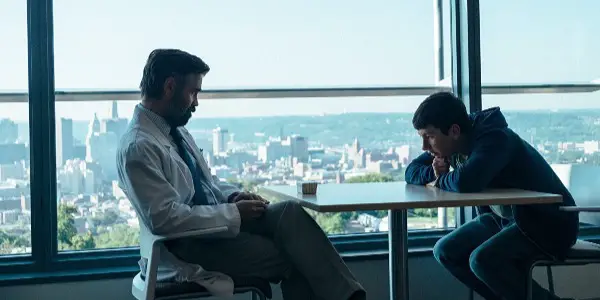
This film is paradoxically shot with both a cleanliness and a vileness that somehow intertwine to form a wholly unique atmosphere. Stunning overhead shots of a dark escalator descending between two gleamingly white walls demonstrate this perfectly, Lanthimos is trying to toy with our senses here. The performances are unsettling enough to further throw this intentionally off balance, Colin Farrell’s monotonous vocal tone is a source for both dark laughs and stern threats while Nicole Kidman’s unnerving use of body language forces her character into a place impossible to identity with.
These performances simply would not work in any other film, yet here they’re nothing short of extraordinary. The film’s plot takes you to some fantastically dark places, but Lanthimos infuses it with his trademark humour – you laugh along with the story, even though what you’re watching is dark to the point of sickening. This is a gleefully daring film that grips from the first frame, even if it takes its time to unleash the extent of what its truly subjecting you to – the slowness is rarely felt though, the film’s compelling script and uneasy atmosphere never relent. This is bold film making, absurdism at its most absurd but never short of brilliance. For my money, it’s the film of the festival.
Last Flag Flying (Dir: Richard Linklater)
Alistair Ryder: Although he has a reputation as one of the finest realist directors in America, with the ability to transform the mundanities of everyday life into transcendental cinema, Richard Linklater is perennially underrated for his experimental streak. He’s made animated docu-fictional works that explore the subconscious, experimented with rotoscoping, and most notably, produced an epic masterpiece over the course of 12 years.
Following the underwhelming jock-fest that was Everybody Wants Some, Linklater has returned with what may be the first film in his eclectic back catalogue that could be accurately described as pedestrian. Last Flag Flying is a sequel to Hal Ashby’s 1973 effort The Last Detail, set thirty years later in December 2003, during the fallout from the Iraq war. Here, Jack Nicholson’s role is reprised by Bryan Cranston, who isn’t putting his own stamp on the character so much as he is doing a ceaselessly irritating impression of Nicholson throughout – to such a grating extent, you half expect him to start shouting “here’s Johnny” to top it all off.
Cranston’s Sal is now a bartender, unexpectedly visited in December 2003 by Doc (Steve Carrell), who has recently lost his wife and his marine son, and wants his two former corps buddies (Laurence Fishburne rounds out the central cast) to attend the funeral. Fisburne and Carrell give excellent, grounded performances – yet Linklater frequently undermines this by merely making them the effective “straight guys” to Cranston’s overblown Nicholson caricature. Carell in particular is excellent, managing to communicate the distress of a man in his situation without ever overplaying the symptoms of grief. In a film that feels like an overly forced attempt at a sequel, which has no real artistic reason to exist, Carrell delivers an earnest humanity worthy of a far greater film.
Last Flag Flying is a forgettable effort from a filmmaker capable of far greater things. His reverence for Hal Ashby’s original film shines through – but this mostly comes across as mawkish fan fiction, with a sharp contrast in tone to its predecessor that feels increasingly jarring.
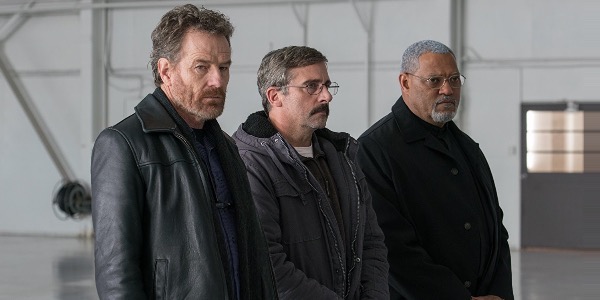
Chloe Walker: A new Richard Linklater film is usually a cause for celebration, but Last Flag Flying is a decidedly average entry in the director’s illustrious filmography. It’s 2003. Having just lost his Marine son, Doc (Steve Carell), gathers his old buddies from the corps – man-child Sal (Bryan Cranston), and Reverend Richard (Laurence Fishburne) – for a road trip to bring his body home. The three used to be close, but time and circumstance have pushed them in very different directions.
Though billed as a ’spiritual sequel’ to The Last Detail, Last Flag Flying is nonetheless prototypical Linklater. Dialogue-centric and revolving around a journey, its home turf for the director, which is perhaps one of the reasons it feels so underwhelming. There’s not a lot new here, and the Linklater formula isn’t executed with as much grace as in the Before Trilogy, or innovation as in Waking Life.
The movie gets down-right annoying at times, thanks to Bryan Cranston’s one-note performance. To be fair to Cranston, it is as much in the screenplay as his acting, but his insensitive gregariousness steals all the air from the more nuanced turns of Carell (who is once again awards-worthy), and Fishburne.
Last Flag Flying is by no means a bad film. Two out of three lead performances are very good, and there are frequent moments of humour (their 2003-era excitement over getting mobile phones is hilarious), and pathos. Overall though, it’s far below the quality that Linklater is capable of.
Ryan Morris: Richard Linklater’s new film wastes no time in getting started. Two of our three protagonists are introduced within the opening sixty seconds, and the third follows in a matter of minutes. Even this early on, Last Flag Flying bears the stamp of a Linklater classic – the cinematography is simple but satisfying, the dialogue is fizzing quietly, and the characters already feel like people you’d want to watch for hours on end. As a big fan of his recent work, it makes me very happy to report that Last Flag Flying is simply the latest in a series of runaway successes a director currently at the top of his game.
Where Last Flag Flying stands out though is in the focus its emotional core. While more recently Linklater has been exploring youth, be it over a small canvas in Everybody Wants Some!! or a huge one as per Boyhood’s scale, this film sees him tackle an older soul. Larry, Richard and Sal talk frequently of the past – Linklater’s eye is still firmly on the vitality and influence of youth – and whether they’re looking back with happiness or sadness, nostalgia or regret, it’s these scenes that make the film such a powerhouse of joy and emotion. A train set sequence sees the trio bitterly discuss the pointlessness and ineptitude of war before the following scene has them laughing so hard at their younger selves you fear one of them might pass out.
And it’s a gleefully infectious feeling. As well as Cranston, Carell and Fishburne serving up three effortlessly great performances, Linklater’s command of tone here is impeccable: Last Flag Flying is funny in all the right places and tender in all the others. The film never misses an emotional beat, but never feels manipulative in how it uses such a subject as its core. By the time it reaches its very final sequence – which I would argue is its most moving, in such a beautiful, simple way – you’ll probably just want to stay with these characters for ever and ever, I know I did.
Last Flag Flying didn’t have me sobbing like other films of its subject matter could’ve, but I lost count of how many times I felt myself gently tearing up – and I think, in a way of quiet brilliance, that takes even more skill. Linklater has served up another classic.
Let the Sun Shine In (Dir: Claire Denis)
Andrew Winter: Last time I saw Juliette Binoche, she was gurning her way through Bruno Dumont’s bafflingly awful Slack Bay, in what surely amounted to a career low for the veteran actress. Thankfully, Let The Sun Shine In marks a sterling return to form, as she teams up with auteur Claire Denis for the first time, in an off-kilter romantic comedy that goes heavier on the comedy than it does the romance. Binoche plays Isabelle, a Parisian artist, with multiple suitors, none of whom she seems able to form any sort of lasting or meaningful bond with.

These include an arrogant banker (Xavier Beauvois), who tells her: “You are charming, but my wife is extraordinary”, a pretentious, angst-ridden actor (Nicolas Duvauchelle), and an ageing pretty boy (Paul Blain), she dances with to Etta James’s ‘At Last’. Every character in Denis’s movie is a fully-fledged adult, many of whom are over 50, yet they conduct their amorous business with all the maturity and decisiveness of naïve teenagers. It’s almost a surprise they don’t swap love bites and insult each other on Snapchat. It is somewhat difficult to accept a woman as effervescently gorgeous and interesting as Isabelle as a serial loser in love, but Binoche imbues her with just the right amount of ennui and vulnerability to make us believe in her, although rooting for a character who is often so self-absorbed and listless (she constantly complains of tiredness, despite doing very little) is somewhat harder.
Despite the film’s black comedy and caustic barbs, there’s genuine sadness here too. From the lonely old gent at the fish shop, to Isabelle’s miserable-looking young daughter, and the principle character herself, who we’re told cries herself to sleep every night, no one is having a good time. The heart might indeed “want what it wants”, as the saying goes, but its chances of getting it are clearly remote.
Loving Vincent (Dir: Dorota Kobiela, Hugh Welchman)
Chloe Walker: There is a production logo that appears just before Loving Vincent begins that is painted in the same style as the movie. Just that production logo caused the man in the seat next to mine to gasp. That is the level of beauty that we are dealing with here.
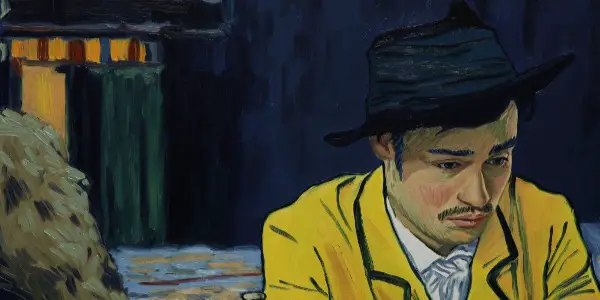
The first oil-painted animated movie, Loving Vincent was created by one hundred painters working in the style of Vincent Van Gogh. The result is gorgeous; beams of light dance around lamps and streetlights in the manner of Van Gogh’s ‘Starry Night’ and rain splotches down in impressionistic drops. Due to the distinctive style of animation, you can actually see the paint being added to the screen. The amount of work that must have gone into this film is extraordinary.
What a pity then that the story is so lacklustre. Armand Roulin (Douglas Booth), is given by his father (Chris O’Dowd), a letter written by the recently departed Vincent to his brother Theo. Finding Theo is also dead, Roulin looks for someone to deliver the letter to, along the way discovering more about why Van Gogh killed himself.
Except that nobody knows why, and the constant, repetitive speculation that powers this film rapidly becomes boring. This is a detective story with no solving; a character study that offers little more than generalisations. There’s no pace and little point. Loving Vincent may look beautiful, but it sure is boring.
The Party (Dir: Sally Potter)
Ryan Morris: 71 minutes long. A cast of seven. Shot in black and white and all set in one household, almost in real time. You’d be forgiven for thinking Sally Potter’s The Party was made back in the 1930s. The old fashioned style contrasts brilliantly with the modern style dialogue and obviously 21st century technology though, crafting a film that feels as wonderfully original as it is riotously enjoyable.
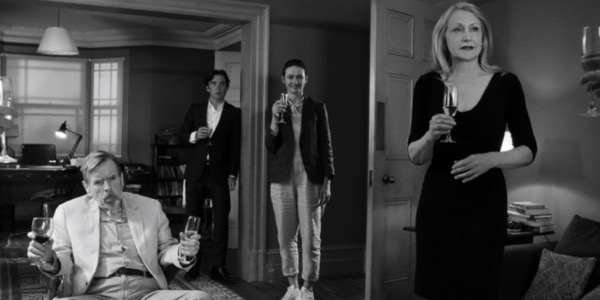
What gives The Party an even bigger boost is the absolute brilliance of its casting. Cillian Murphy is deliriously great as a coked up banker with a gun, Kristin Scott Thomas is a blast as a woman whose celebration ends up in bloodshed, Emily Mortimer’s consistent look of dread and worry is never not funny. Patricia Clarkson steals the film though, rolling out her biting dialogue with such sharp tongued delivery it’s a wonder her gums don’t bleed. The Party is a very funny film, and a great deal of that comes from Clarkson.
The film soars through its lean, quick 71 minutes and builds the character-based tension marvellously. Small quibbles turn to violence, loving partners spill long lost secrets. It feels like it should be a traumatising watch, but Potter’s script is seamless in how it allows us to marvel at such horrors. The Party is a brilliant film, the kind best experienced in a packed cinema where everyone already knows exactly what they’re in for. The icing on the cake? It all builds to a singular reveal detailed perfectly with just one line, and the moment it registered in my brain I didn’t know whether to smile from ear to ear or let my jaw hit the ground.
Thelma (Dir: Joachim Trier)
Andrew Winter: Norwegian director Joachim Trier reconfigures Brian De Palma‘s Carrie, for Thelma, a slow-burning, coming-of-age tale with a supernatural edge. Eili Harboe is the titular character, a teenage girl leaving her devoutly religious parents for university in the big city. There she meets Anja (Kaya Wilkins), and immediately falls for her. But the onset of a series of debilitating seizures threatens to put the kibosh on Thelma’s new life of freedom, especially when they lead her to manifest strange and terrifying psychic powers.
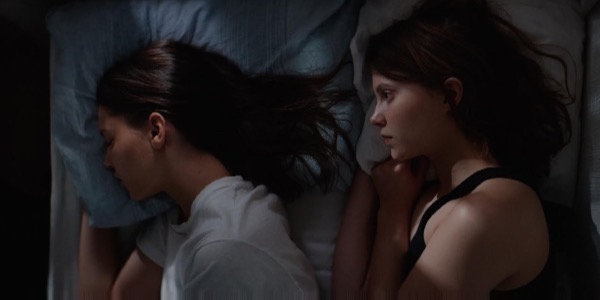
The gaining of superhuman abilities as a metaphor for reaching adulthood, or experiencing a sexual awakening, is nothing new. It is right there, front and center, in De Palma‘s film, and the entire X-Men franchise is at least partially built on the exact same notion. But Thelma isn’t at all undermined by the familiarity of its subject matter, Trier serving up something different and rewarding enough to quell any such concerns. He extracts fine performances from his young principles, and uses CG effects both sparingly and powerfully (if you thought mother! contained the most chilling scene featuring a male infant you’ll see all year, think again). The director has previously specialized in low-key human dramas and it’s a sensibility he again brings to bear here.
Thelma’s first naïve steps into a more adult world, and her affection for Anja, are played out with just the right combination of angst and awkwardness. But there’s always something ticking away in the background that points to the far darker twists and turns to come. Harboe’s Thelma is a fearsome dichotomy – a repressed and confused young woman, with the power of a god, suddenly free of her controlling mum and dad, and their diktats. Things can’t possibly end well.
Which of these movies are you most looking forward to? Stay tuned to Film Inquiry for our final LFF dispatch later this week.
Does content like this matter to you?
Become a Member and support film journalism. Unlock access to all of Film Inquiry`s great articles. Join a community of like-minded readers who are passionate about cinema - get access to our private members Network, give back to independent filmmakers, and more.
Alistair is a 25 year old writer based in Cambridge. He has been writing about film since the start of 2014, and in addition to Film Inquiry, regularly contributes to Gay Essential and The Digital Fix, with additional bylines in Film Stories, the BFI and Vague Visages. Because of his work for Film Inquiry, he is a recognised member of GALECA, the Gay & Lesbian Entertainment Critics' Association.













